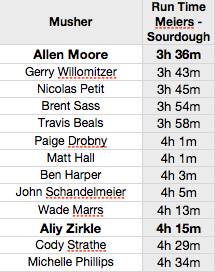As Yoda might say, “Warned you, I did!… Calculating rest times crazy making, it is!”
I’m hoping most of you have taken my advice to ignore the rest time data. If not, I can almost guarantee you’ve gone around in circles and still don’t feel like you’ve got it right.
I say this partly because the usual complexities of who has taken how much rest are now further complicated by trying to account for start differentials. (See below if you dare.)
Trust me, here’s all you really need to look at:
Allen was once again fastest between Meiers Lake and Sourdough, shaving another 9 minutes off the pace of the leader. Cumulatively over the first three stints, Allen is now only 14 minutes off the lead. Aliy is in a virtual tie for 6th place, with only 6 minutes separating four teams. In between are three other teams separated by only 10 minutes.
This is a very, very close race! That’s the straight dope. Period. Full stop…. Stay tuned!
Okay… So… For those of you who are determined to make yourselves crazy, here’s some explanation about why you may be having a hard time reconciling the data:
As you will recall, teams were started at two-minute intervals. As a result, the last (43rd) team started 86 minutes behind the first team. To make the race more fair, the first team must “give back” that time by waiting 86 minutes longer at the checkpoint where they take their mandatory six-hour rest. This “give back” time is called their “start differential.”
Every team in the race must “give back” two minutes for every place they started ahead of the last team. For example, Allen started in 25th position and (43-25)*2 = 18*2 = 36 minutes, and that is his “start differential.” Similarly, Aliy started two minutes behind Allen in 26th position, so she only needs to “give back” a total of 34 minutes. Got it?
Now, these “start differentials” are in addition to the required 18 hours of mandatory rest. Accounting for them is a bit tricky, and requires making a distinction between “actual rest time” and “official rest time.” The fact that this data was initially reported in error on the CB300 spreadsheet didn’t help matters. It’s since been fixed — kudos to the exhausted, glassy eyed spreadsheet wrangler who worked it out! — but it’s still tricky to factor into your calculations.
Another complicating “rest time” issue is that “official rest time” can only be logged in half-hour increments, rounded down. For example, a team that spends 4 hours and 6 minutes in a checkpoint, only gets “credit” for 4 hours of “official rest.” If it spends 3 hours and 57 minutes there, it only gets credit for 3.5 hours.
All of the top teams — and especially the SPK teams — are extremely diligent about managing the clock. They want start on time, every time, at every checkpoint, and never waste a single minute.
In addition to the musher’s own checking with race officials, it is a handler’s job to do the math. No matter how tired, cold and hungry you are, you do the math. You do it again. You check it with other handlers. You check it again with the officials. Wash, rinse, repeat.
Lucky for you, because of the teams’ diligence about being on time, you don’t have to worry about “start differentials” or accumulated “official rest” or any of the other maths. Somewhere between the start and finish lines, all the non-running times work themselves out. All you have to look at are the run-times between checkpoints and their cumulative value. Whichever team runs the course in the least cumulative run-time will win.
As Yoda might say, “Mind what you have learned!… Save you, it can!”











Thank you for the best description I have ever heard about how this works. You rock in the math department.
Got it…I think. Appreciate the very good explanation. Been glued to my IPad since the start. As always you do a great job!
Very clear analysis as always! Any word on if Allen left Sourdough with all 12 dogs? Petit is down to 9.
Monica
Great job Mac! I am just catching up now and will be watching closely. When do we estimate teams to arrive at finish line? I need to plan around my job! lol
padee in Santa Rosa
Mac, very well done! Thanks for the education, particularly about "rounding down" to the half hour. Can't wait until all are safely home, fed, rested, and ready to tell their stories!
Frances
You are the master time keeper Mr Magellan!! Awesome job explaining once again!
May the FORCE be with the Team!
Jedi sled dogs, just sayin'.
the young padawans are most greatful for your learned teachings! Thank you!
Thank you so much Mac. Awesome explanation. I understand it now. You are a genius in math.